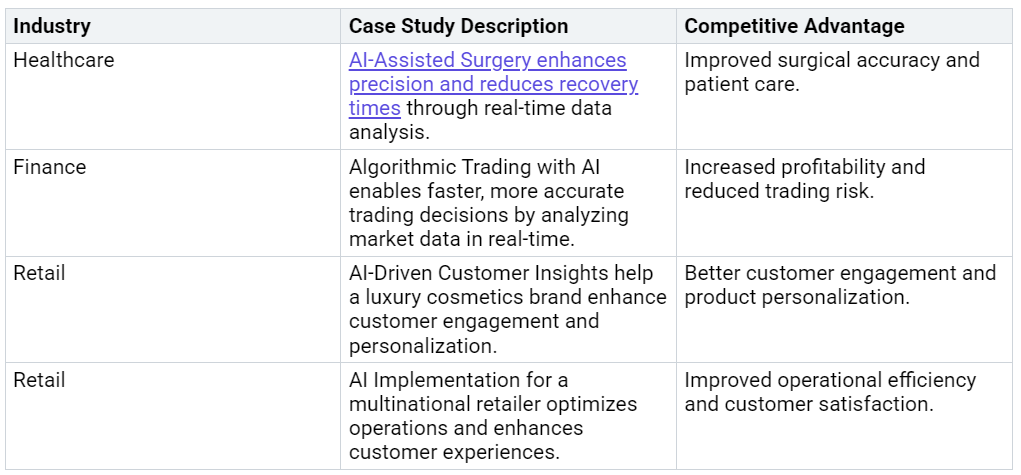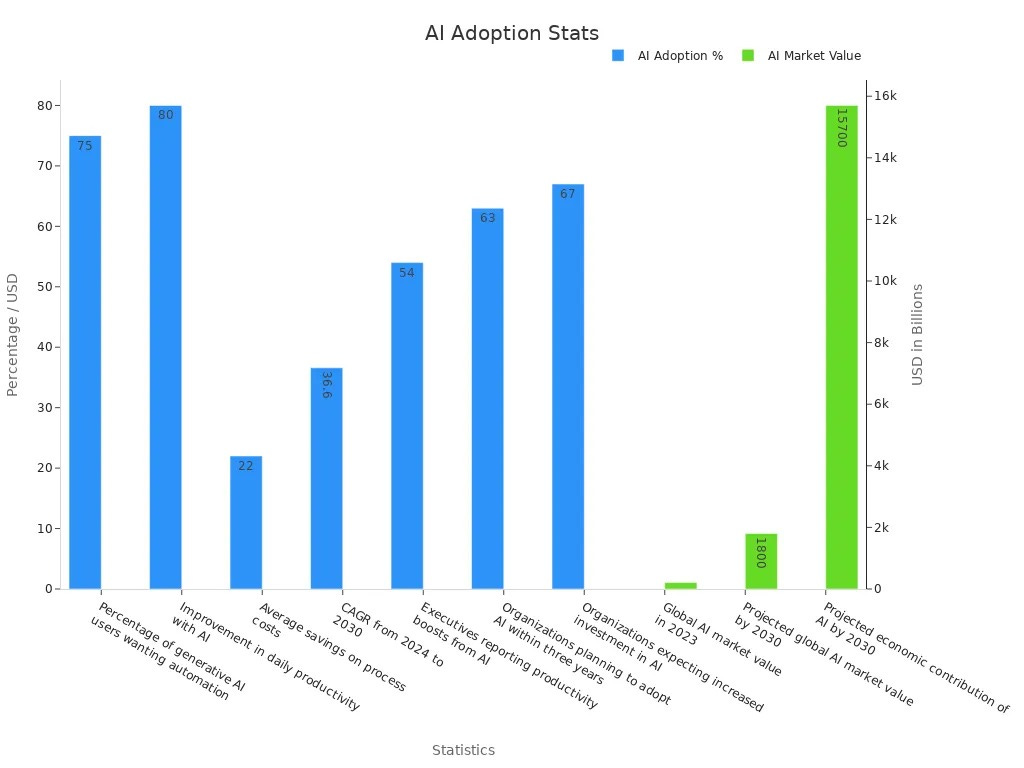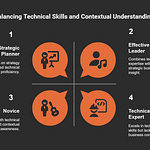AI is changing the game for entrepreneurs like never before. Imagine using tools that boost your marketing ROI by 20% or cut costs by 32%. That’s not just theory—it’s happening now. Companies using AI-driven personalization see a 40% jump in order value, and content optimized with AI insights gets 83% more engagement. These numbers aren’t just stats; they’re proof that becoming an AI-Powered Entrepreneur isn’t optional anymore—it’s the future. Ready to see what’s possible?
Key Takeaways
Use AI tools to work faster and grow. Let AI handle simple tasks and study data to make better choices.
Add AI to your main business activities. Plan well and use good data to get better outcomes.
Learn about new AI ideas and tools. Keep up with news and try new things to stay ahead.
Create a team that supports AI. Teach, work together, and celebrate wins to encourage new ideas.
Plan for future success with AI. Match AI uses with your goals and set rules for fair use.
What Is an AI-Powered Entrepreneur?
Defining the AI-Powered Entrepreneur
Let’s start with the basics. An AI-Powered Entrepreneur is someone who uses artificial intelligence tools to run their business smarter, faster, and more efficiently. Instead of relying on traditional methods, they integrate AI into their workflows to automate tasks, analyze data, and make better decisions. Think of it as having a supercharged assistant that never sleeps.
For example, imagine using AI to handle customer service, create marketing campaigns, or even predict future trends in your industry. It’s not just about saving time—it’s about unlocking possibilities that were once out of reach. As an AI-Powered Entrepreneur, you’re not just running a business; you’re building a system that evolves and improves over time.
Why AI Is Essential for Modern Entrepreneurs
Why is AI such a game-changer? Let me break it down:
AI enhances decision-making by analyzing complex datasets faster and more accurately than humans.
It automates routine tasks, freeing up time for creative and strategic activities.
AI identifies trends and opportunities that traditional methods might miss, driving innovation.
In today’s fast-paced world, these advantages aren’t optional—they’re essential. Without AI, you risk falling behind competitors who are already using it to scale their businesses.
The Competitive Advantage of AI in Business
AI doesn’t just level the playing field; it tilts it in your favor. Businesses that embrace AI gain a competitive edge across industries. Here’s how:
These examples show how AI transforms industries, making businesses more efficient, profitable, and customer-focused. As an AI-Powered Entrepreneur, you’re not just keeping up—you’re leading the charge.
Why Now Is the Time to Embrace AI
The Rapid Evolution of AI Technologies
AI is evolving at a breakneck pace, and it's reshaping the way we do business. You might wonder how fast things are changing. Well, AI-powered image recognition is now helping us analyze historical relics and even restore damaged artifacts. It's like having a digital archaeologist at your fingertips. AI-based spectral imaging is revealing hidden layers in texts and artworks, offering new insights into lost historical details. And let's not forget machine learning algorithms that analyze economic data from past centuries to predict trade trends and financial crises. These advancements highlight AI's role in understanding historical patterns and shaping the future.
How AI Is Disrupting Traditional Industries
AI is not just a buzzword; it's a game-changer across various sectors. Here’s a quick rundown of how it's shaking things up:
Market Research: AI tools like sentiment analysis and predictive analytics are providing real-time insights, making market research more dynamic.
Content Creation: By analyzing consumer behavior, AI creates personalized content that optimizes engagement.
Advertising: Programmatic advertising and real-time bidding powered by AI improve targeting and efficiency.
E-commerce: AI personalizes recommendations and assists in inventory management, boosting sales.
Healthcare: Predictive analytics in AI tools enhance diagnostics and treatment outcomes.
Finance: Robo-advisors and fraud detection powered by AI reduce costs and improve efficiency.
These examples show that AI is not just enhancing industries; it's transforming them. As an AI-Powered Entrepreneur, you can leverage these tools to stay ahead of the curve.
The Risks of Falling Behind in an AI-Driven Market
Falling behind in an AI-driven market is a risk no business can afford. The statistics speak for themselves:
Emerging data indicates a significant talent shortage in AI-related fields. Over 80% of business leaders are concerned about finding the necessary talent in the upcoming year. This highlights the risks associated with falling behind in an AI-driven market. Companies may struggle to implement AI solutions effectively without the necessary skilled workforce. AI has transitioned from a behind-the-scenes tool to a critical component in market research and campaign execution. The cost-effectiveness of AI solutions poses a risk for marketers who do not adapt quickly.
Key Strategies for Thriving as an AI-Powered Entrepreneur
Leveraging AI Tools for Efficiency and Growth
If you’re like me, you’re always looking for ways to save time and get more done. That’s where AI tools come in. They’re not just fancy gadgets—they’re game-changers for efficiency and growth. Imagine having a tool that handles repetitive tasks, analyzes data, and even predicts trends. Sounds like a dream, right? But it’s real, and it’s happening now.
Here’s how businesses are using AI tools to transform their operations:
Boosting productivity by automating routine tasks like data entry and scheduling.
Using advanced analytics to uncover valuable insights and make smarter decisions.
Strengthening customer relationships with AI-powered CRM systems.
Optimizing marketing efforts with automated solutions that target the right audience.
Enhancing sales performance with AI-driven forecasting tools.
For example, I’ve seen companies use AI to improve customer engagement and satisfaction. Tools like chatbots provide instant responses, while data analysis tools help businesses understand what their customers really want. The result? Happier customers and higher revenue.
The global AI market is growing fast—it’s expected to hit $243.70 billion by 2025. Businesses using AI solutions report a 40% increase in operational efficiency and a 25% boost in revenue. If that’s not a reason to dive in, I don’t know what is.
Integrating AI into Core Business Operations
Let’s talk about the big picture. It’s not enough to use AI tools here and there. To truly thrive as an AI-Powered Entrepreneur, you need to integrate AI into the core of your business. Think of it as weaving AI into the fabric of your operations.
Here’s a simple roadmap to get started:
Develop a Clear AI Strategy: Align your AI goals with your business objectives. What do you want to achieve? More sales? Better customer service? Start there.
Invest in Data Quality: AI thrives on data, but not just any data. High-quality, well-organized data is essential for AI to work its magic.
Foster Cross-Functional Collaboration: Get your teams involved early. When everyone works together, the integration process becomes smoother and more effective.
Take PepsiCo, for example. They involved their teams early in the AI adoption process, and it paid off big time. By integrating AI into their marketing strategies, they achieved better results and streamlined their operations.
When you integrate AI into your core business, you’re not just improving efficiency—you’re setting the stage for long-term success. Whether it’s automating HR tasks to attract top talent or using AI for financial decision-making, the possibilities are endless.
Staying Ahead of AI Trends and Innovations
AI is evolving at lightning speed. Staying ahead of the curve isn’t just a nice-to-have—it’s a must. As an AI-Powered Entrepreneur, you need to keep your finger on the pulse of the latest trends and innovations.
Here’s what I recommend:
Follow industry news and reports. For example, studies like those from Trullion and FEI offer insights into AI adoption in finance and accounting.
Experiment with new tools. Don’t be afraid to try out the latest AI platforms. Some might surprise you with their capabilities.
Learn from best practices. Look at how other businesses are integrating AI-driven insights into their strategies.
The key is to stay curious and adaptable. AI is transforming industries, and those who adapt will thrive. Entrepreneurs who embrace continuous learning and innovation will always stay one step ahead.
Building an AI-Driven Business Culture
Creating an AI-driven business culture isn’t just about adopting tools—it’s about transforming how your team thinks, works, and collaborates. When AI becomes part of your company’s DNA, it unlocks possibilities you never imagined. Let me share how you can build this culture and why it matters.
Why an AI-Driven Culture Matters
An AI-driven culture isn’t just a trend; it’s a necessity for staying competitive. When your team embraces AI, they don’t just work faster—they work smarter. They start seeing opportunities in data, automating repetitive tasks, and focusing on innovation. It’s like giving your team superpowers.
Take IBM, for example. They used watsonx Orchestrate in HR operations and saved 12,000 hours in just one quarter. Imagine what your team could do with that kind of efficiency. McDonald’s is another great example. They’re using AI-driven solutions to improve customer service, automating order-taking across markets. These companies aren’t just using AI—they’re embedding it into their culture, and the results speak for themselves.
Steps to Build an AI-Driven Culture
Building this culture doesn’t happen overnight, but it’s absolutely doable. Here’s how I’d approach it:
Start with Education
Your team needs to understand what AI can do. Host workshops, share success stories, and let them experiment with tools. When they see the possibilities, they’ll get excited.Lead by Example
As an AI-Powered Entrepreneur, you need to show your team how it’s done. Use AI tools in your own workflows and share the results. When they see you embracing AI, they’ll follow suit.Encourage Collaboration
AI works best when teams collaborate. Break down silos and encourage cross-functional projects. For example, IBM’s Project Wisdom uses natural language processing to automate coding. Imagine your marketing and IT teams working together to create smarter campaigns.Celebrate Wins
Every time AI improves a process or saves time, celebrate it. Recognition motivates your team and reinforces the value of AI.
Overcoming Resistance
Let’s be real—change can be scary. Some team members might resist AI because they fear it will replace their jobs. Here’s how I handle that:
Tip: Focus on how AI enhances their roles, not replaces them. Show them how AI frees up time for creative and strategic work.
For example, when IBM implemented AI in HR, it didn’t replace employees—it streamlined promotion assessments, letting HR focus on talent development. When your team sees AI as a tool for growth, they’ll embrace it.
The Long-Term Benefits
Once your team adopts an AI-driven mindset, the benefits compound. You’ll see faster decision-making, improved customer experiences, and a culture of innovation. It’s not just about efficiency—it’s about creating a business that evolves with the times.
Companies like McDonald’s and IBM are proof that an AI-driven culture isn’t just possible—it’s transformative. When you build this culture, you’re not just preparing for the future; you’re leading it.
Common Mistakes to Avoid When Adopting AI
Overcoming Fear and Resistance to AI
Fear of AI is real, and I’ve seen it firsthand. People worry about losing their jobs or feel overwhelmed by the unknown. But here’s the thing: fear fades when you understand something. That’s why transparency and education are key.
I’ve found that hosting workshops works wonders. When you show your team how AI supports their work instead of replacing it, they start to see the benefits. For example, one company I worked with used workshops to address concerns about job security and data privacy. The result? Confidence in AI jumped by 35%, and productivity improved.
Another tip? Celebrate small wins. When your team sees AI saving time or improving results, they’ll feel more motivated to embrace it. And don’t forget to create a safe space for questions. Let your team voice their concerns without judgment. It’s amazing how much engagement grows when people feel heard.
Avoiding Over-Reliance on AI Without Strategy
AI is powerful, but it’s not perfect. Relying on it without a clear strategy can backfire. I’ve seen businesses make this mistake, and it often leads to poor decisions.
Here’s why: AI tools can’t replace critical thinking. For instance, research shows that up to 70% of references in AI-generated academic works are inaccurate. That’s a big problem if you’re not double-checking the output.
To avoid this, always pair AI with human expertise. Use it to support decisions, not make them for you. And make sure your team understands the limits of AI. A lack of domain knowledge or low task familiarity can increase the risk of over-reliance.
Ensuring Ethical and Responsible AI Use
Ethical AI isn’t just a buzzword—it’s a necessity. Misusing AI can damage your reputation and erode trust. I always remind entrepreneurs that everyone in the organization, from executives to staff, plays a role in using AI responsibly.
Start by creating clear guidelines for AI use. For example, define how your team should handle data privacy and avoid bias in algorithms. A survey by MIT Technology Review found that 87% of managers recognize the importance of responsible AI. That’s a good sign, but it’s up to us to turn recognition into action.
Education is another must. Teach your team about responsible AI practices. When everyone understands the stakes, it’s easier to build trust with your customers. And trust? That’s your biggest competitive advantage in today’s market.
The Future of Entrepreneurship in an AI-Driven World
Emerging Opportunities for AI-Powered Entrepreneurs
AI is opening doors to opportunities we couldn’t have imagined a decade ago. It’s not just about automating tasks—it’s about transforming industries. For instance, AI is revolutionizing agriculture by optimizing crop yields and managing resources more efficiently. In healthcare, it’s enhancing diagnostics and streamlining patient care. Even tourism is getting a boost, with AI creating personalized travel experiences that wow customers.
Manufacturing is another big winner. AI-powered predictive maintenance keeps machines running smoothly, while supply chain optimization ensures products get where they need to be, faster and cheaper. And let’s not forget finance. AI is improving access to social assistance programs, making financial services more inclusive.
Tip: Look for industries where AI is still underutilized. That’s where the biggest opportunities lie.
The bottom line? Entrepreneurs who embrace AI can tap into these emerging markets and create solutions that truly make a difference.
How AI Will Redefine Business Models
AI isn’t just tweaking how businesses operate—it’s flipping the script entirely. Traditional business models are being reimagined through the lens of AI. Companies are no longer just selling products or services; they’re offering personalized, data-driven experiences.
Take the Business Model Canvas, for example. AI is reshaping every element of it. Advanced analytics help businesses identify market opportunities faster. Machine learning anticipates customer needs, allowing companies to tailor their offerings. This shift doesn’t just enhance efficiency—it redefines value propositions and revenue streams.
The message is clear: AI isn’t just a tool; it’s a game-changer for how businesses create and deliver value.
Preparing for Long-Term Success with AI
Success with AI isn’t about quick wins—it’s about playing the long game. To thrive, you need a solid strategy. Start by aligning AI applications with your business goals. For example, use chatbots to improve customer engagement or machine learning for better forecasting.
Here’s a roadmap to get you started:
Build a strong data infrastructure. High-quality data is the fuel AI needs to perform.
Test with pilot projects. Experiment before scaling up to minimize risks.
Train your team. AI literacy is essential for smooth adoption.
Note: Companies with dedicated AI training programs saw adoption rates improve by 50%.
Don’t forget governance. Establish oversight mechanisms to ensure ethical AI use. Regular audits and performance reviews will keep your systems on track. Remember, AI isn’t static—it evolves. Continuous improvement will help you adapt and stay ahead.
The future belongs to those who prepare for it. With the right approach, AI can be your most powerful ally in building a business that lasts.
AI isn’t just a tool anymore—it’s the backbone of entrepreneurial success today. Businesses that embrace it unlock opportunities they never thought possible. Look at Cursor, which hit $100 million in ARR in just 21 months, or MidJourney, reaching over $200 million in ARR by creating something their community loved.
AI doesn’t just boost revenue. It transforms how we work. By automating repetitive tasks, it frees up time for strategy and creativity. Predictive analytics tools help businesses stay ahead by forecasting trends and customer behavior.
Start small. Build systems. Take action today. The future of entrepreneurship is AI-powered, and it’s waiting for you.
FAQ
What is the first step to start using AI in my business?
Start small. Pick one area where AI can make a big impact, like customer service or marketing. Test tools like ChatGPT Pro or Jasper AI. Learn how they work and experiment with prompts. Once you see results, expand to other areas.
Do I need technical skills to use AI tools?
Not at all! Most AI tools are user-friendly. If you can type a question into Google, you can use AI. Many platforms offer tutorials to help you get started. You’ll learn as you go, and it’s easier than you think.
How can AI help me save time?
AI automates repetitive tasks like scheduling, data entry, and customer support. It analyzes data faster than humans, giving you insights in seconds. Tools like chatbots handle FAQs, freeing you up for strategy and creativity. It’s like having an extra team member.
Is AI expensive for small businesses?
Nope! Many AI tools are affordable. For example, ChatGPT Pro costs $200/month, which is way less than hiring an employee. Plus, the efficiency and growth it brings make it worth every penny. Start with free trials to see what works for you.
How do I keep my business authentic while using AI?
AI should enhance your voice, not replace it. Use it for research and drafts, but always add your personal touch. Edit AI-generated content to reflect your style. Your unique perspective is what makes your business stand out.

















